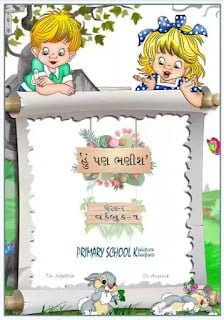PRAGNA WORKBOOK STD 1 2
Teacher friends…
Hello dear …
We are making all efforts to provide education to the children under the Home Learning program run by the Government at the time of the Corona crisis. We are also making workbooks for the children of Std. 1 and 2 under the project ‘I will study too’. A soft copy has been prepared in such a way that it becomes a workbook in just 3 to 4 pages. Contact the following number to get a print out a soft copy of this workbook.

The process of learning different subjects simultaneously is known as integrated learning. The National Curriculum Framework-200P also states that knowledge is intact. Dividing knowledge into different subjects also brings some ease in the process of learning as well as teaching. But in some places breaking down these barriers deepens the study experience.
Pre-primary education is largely based on activities and games through which the basic concepts of language, environment as well as mathematics are assimilated together. That is why any activity that is done by the teacher or guardian should be done consciously keeping in view the aspects and topics of development.
PRAGNA WORKBOOK STD 1 2
an Anganwadi teacher gives a coloring activity to the children. In this activity, he will fill in the shapes so that mathematics education will come, and also he will teach the child to speak the names of different colors so that he can also learn the language.
In the same way, language learning through storytelling or storytelling as well as environmental education could be given by discussing the various animals and birds that come in it. Language can be taught through the use of beads, maths and quizzes can be used to focus on musical and intellectual development through clapping.
PRAGNA WORKBOOK STD 1,2
Peer Learning can also mean peer learning as well as peer learning or peer learning. Pre-primary education is a more informal process than a formal one. The child learns a lot informally during Anganwadi time for which the teacher does not consciously strive.
Such as: listening, observation, imitation etc. Humans usually learn a lot from imitation in the early stages. Speaking the language is mostly learned by imitation. If we look at the example of language learning, it will be noticed that the child interacts more with his peers than with his family members. Where his language develops naturally, he does not hesitate to engage in various activities with his peers.
DOWNLOAD BOOKS
created by
Dipikaben Patel,
Tarijpada Pri. School, Valsad.
Dhawal Patel (A.TEACHER, PRIMARY SCHOOL KADUPURA ) Janak Patel (PRINCIPAL, PRIMARY SCHOOL KHANPURA).
-THANK YOU, FRIENDS.